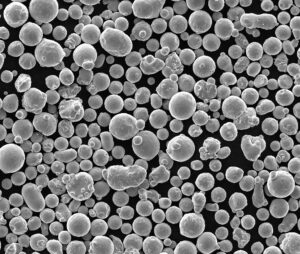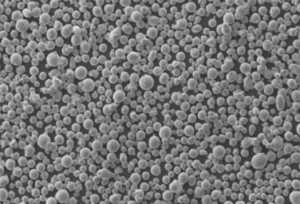1. Einleitung: Warum Eisenschwammpulver in der modernen Fertigung wichtig ist
Sponge iron powder, also known as direct reduced iron (DRI) powder, is a highly porous form of iron produced through the reduction of iron ore without melting it. This powder is widely used across various industries, including powder metallurgy, automotive manufacturing, magnetic materials, and additive manufacturing. For B2B buyers, especially those in manufacturing and industrial sectors, sponge iron powder offers a versatile, cost-effective, and recyclable material source.
Die wichtigsten Vorteile für B2B-Käufer:
- ✅ High compressibility for powder metallurgy (PM) applications
- ✅ Excellent sintering properties
- ✅ Cost-effective raw material for producing structural PM parts
- ✅ Superior machinability when alloyed
- ✅ Recyclable and environmentally friendly
As demand for lightweight and high-strength components grows, sponge iron powder is being increasingly adopted by industries looking to optimize performance and reduce costs.
2. Industrielle Anwendungen von Eisenschwammpulver
Sponge iron powder serves as a core material in the fabrication of sintered components, used across a wide range of industrial applications. Here’s a breakdown of the primary sectors utilizing sponge iron powder in bulk:
| Industrie | Anmeldung | Wichtigste Vorteile |
|---|---|---|
| Automobilindustrie | Engine parts, gears, sprockets | Lightweight, durable, cost-efficient |
| Elektrotechnik und Elektronik | Magnetic cores, inductors | High permeability, soft magnetic properties |
| Bauwesen | Strukturelle Komponenten, Verbindungselemente | Hohe Festigkeit, Korrosionsbeständigkeit |
| Additive Fertigung | 3D-Druck metal parts | High porosity and sinterability |
| Öl & Gas | Valve parts, wear-resistant components | High-temperature stability |
Common Components Manufactured:
- Buchsen
- Lager
- Zahnräder
- Camshafts
- elektrische Kontakte
These applications highlight how sponge iron powder supports high-volume manufacturing with reliable mechanical performance.
3. Types of Sponge Iron Powder & Their Unique Properties
Sponge iron powder comes in various grades, depending on particle size, purity, and production method. The most common production methods include carbonyl, water atomization, and reduction.
Key Types of Sponge Iron Powder:
| Typ | Partikelgröße | Produktionsverfahren | Anwendungen |
|---|---|---|---|
| Pure Iron Powder | <150 μm | Hydrogen/Carbon Reduction | PM structural parts |
| Pre-alloyed Powder | Variiert | Wasserzerstäubung | Automotive, tooling |
| Diffusionslegiert | 100–180 μm | Mixed & Sintered | Bearings, gears |
| Soft Magnetic Iron | Fein | Gaszerstäubung | Magnetische Komponenten |
Shanghai Truer’s Sponge Iron Powder Portfolio
Shanghai Truer Technology Co., Ltd, a trusted supplier since 2009, offers a wide range of PM-Pulver einschließlich:
- PM iron
- PM infiltrated iron
- PM phosphorus iron
- PM hybrid low-alloy steel (FD-0208, FL-4605)
Truer’s sponge iron powder offers excellent compressibility and sinterability, making it ideal for high-precision manufacturing. Truer also supports custom formulations tailored to specific B2B requirements. Their powders are manufactured using advanced water and gas atomization techniques, ensuring consistency and superior metallurgical properties.
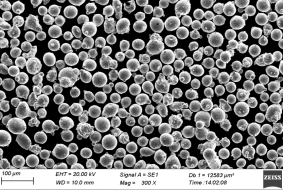
4. Globale Markttrends und Wachstumschancen
The global sponge iron powder market is experiencing steady growth, driven by rising demand for powder metallurgy components in automotive, industrial machinery, and 3D printing applications. According to industry reports, the powder metallurgy market—including sponge iron powder—is projected to reach over USD 10 billion by 2030, with a CAGR of 6-7%.
Key B2B Market Drivers:
- Automobil-Leichtbau: Car manufacturers are increasingly using PM parts to reduce vehicle weight and improve fuel efficiency.
- Electrification & E-Mobility: Electric motors require soft magnetic materials, where sponge iron powder plays a key role.
- Additive Fertigung: The rise of metal 3D printing is increasing demand for customized iron-based powders.
- Nachhaltige Produktion: Recyclable and energy-efficient production methods are pushing industries toward sponge iron powder.
Regionale Markteinblicke:
| Region | Key Trends | Buyer Focus |
|---|---|---|
| Asien-Pazifik | Largest producer & consumer | Cost-efficiency, scalability |
| Europa | Advanced PM applications | Quality, innovation |
| Nord-Amerika | Automotive & aerospace | High-performance materials |
With the shift toward sustainable manufacturing and the growth of precision industries, B2B buyers are prioritizing suppliers that offer both quality and versatility in sponge iron powder solutions.
5. Choosing the Right Sponge Iron Powder Supplier
For B2B buyers, selecting the ideal sponge iron powder supplier is a strategic decision that impacts production quality, cost, and supply chain stability.
Key Considerations When Evaluating a Supplier:
- Produktionskapazitäten: Check if the supplier uses reduction, water atomization, or gas atomization methods.
- Powder Grades Available: Ensure the supplier offers the required grades such as FD-0208, FN-0205, FL-4605.
- Anpassungsoptionen: Can the supplier tailor powder properties to your specific application?
- Zertifizierungen & Normen: ISO9001, RoHS, REACH compliance, etc.
- Logistik & Vorlaufzeiten: Evaluate delivery timelines and global distribution support.
- Technische Unterstützung: Look for suppliers who offer metallurgical advice, testing, and co-development services.
Sample Supplier Evaluation Checklist:
| Kriterien | Bedeutung | Shanghai Truer’s Advantage |
|---|---|---|
| Qualität des Pulvers | ⭐⭐⭐⭐⭐ | High purity, consistent sizing |
| Produktpalette | ⭐⭐⭐⭐ | Over 10 types of PM powders |
| Personalisierung | ⭐⭐⭐⭐⭐ | Tailored blends & grades |
| Lieferung | ⭐⭐⭐⭐ | Global shipping, fast lead time |
| Industry Support | ⭐⭐⭐⭐⭐ | Expert technical support & R&D |
B2B buyers should prioritize suppliers like Shanghai Truer who not only deliver material but also offer complete powder metallurgy solutions. Learn more about Shanghai Truer’s background and technical capabilities.
6. Top Wholesale Sponge Iron Powder Suppliers in Asia
Asia is the world’s leading hub for sponge iron powder production due to its cost-efficiency, technological advancements, and large-scale manufacturing infrastructure. Here are some of the top suppliers in the region catering to B2B distributors and industrial buyers:
Top 5 Sponge Iron Powder Suppliers in Asia:
| Anbieter | Land | Spezialisierung | B2B-Dienste |
|---|---|---|---|
| Shanghai Truer Technology Co. Ltd. | China | PM powders, 3D printing powders, additives | OEM/ODM, bulk orders, technical support |
| Hoganas India Pvt Ltd | Indien | Iron-based powders for PM & welding | Wide distribution network |
| JFE Steel Corporation | Japan | Alloyed & non-alloyed iron powders | Materialien in Automobilqualität |
| Kymera International | China & Korea | Specialty metal powders | Kundenspezifische Pulverentwicklung |
| Pometon S.p.A (Asia division) | Italien/Asien | Atomized iron, copper powders | High-volume industrial supply |
Warum Shanghai Truer sich auszeichnet:
- ✅ Offers both traditional and advanced powder types like diffusion alloyed and hybrid PM steels.
- ✅ One of China’s most professional PM additive suppliers.
- ✅ Supplies to industries like automotive, tool manufacturing, and additive manufacturing.
- ✅ Provides kontakt zum Support for global distributors and OEMs.
Thanks to its integrated R&D, production, and logistics capabilities, Shanghai Truer is increasingly becoming the preferred partner for B2B buyers seeking quality and scale.
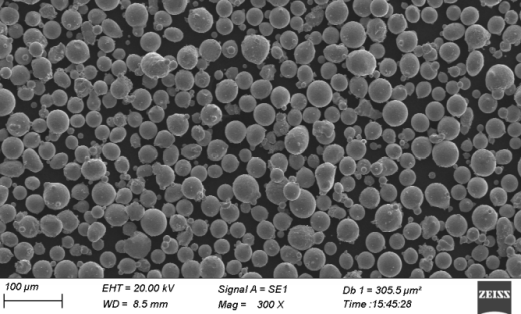
7. Why More Distributors Are Sourcing from Chinese Manufacturers
In recent years, global wholesalers, distributors, and OEMs have increasingly turned to Chinese suppliers for sourcing sponge iron powder. This shift is not only driven by pricing advantages but also by improvements in quality, innovation, and supply chain reliability.
Key Reasons Why B2B Buyers Prefer Chinese Sponge Iron Powder Suppliers:
- Kosteneffizienz: Chinese manufacturers offer highly competitive pricing due to economies of scale and local raw material access.
- Fortschrittliche Fertigung: Many Chinese suppliers now use state-of-the-art equipment like water atomization and hybrid atomization.
- Product Diversity: From basic sponge iron to prealloyed and diffusion-alloyed powders, China offers a wide product range.
- Anpassungsmöglichkeiten: Suppliers like Shanghai Truer offer tailored solutions for specific industrial applications.
- Schnellere Vorlaufzeiten: With better logistics infrastructure and production planning, Chinese manufacturers are shortening delivery cycles.
What to Look for When Sourcing from China:
| Kriterien | Bedeutung | What to Expect from Shanghai Truer |
|---|---|---|
| Technische Unterstützung | Sehr hoch | Dedicated R&D and PM experts |
| Erfahrung im Export | Hoch | 14+ years in international trade |
| Materielle Konsistenz | Hoch | Stable quality across batches |
| Personalisierung | Essential | Tailored powder solutions |
| Zertifizierungen | Obligatorisch | ISO, RoHS, and other industry standards |
When choosing a Chinese supplier, it’s critical to work with a company that not only delivers materials but also provides long-term strategic support. Shanghai Truer is a standout in this regard, offering a full suite of powder metallurgy products and services, including PM-Pulverlösungen and technical assistance.
8. Warum sollten Sie Shanghai Truer Technology Co. als Ihren Lieferanten wählen?
Shanghai Truer Technology Co., Ltd is one of China’s most trusted names in the powder metallurgy industry. Established in 2009 and entering the additive manufacturing space in 2019, Truer has grown into a full-service provider of high-quality sponge iron powder and related PM materials.
Core Advantages of Partnering with Truer:
- Umfassende Produktlinie:
- PM Bronze, PM Iron, PM Steel, PM Stainless Steel, PM Infiltrated Iron, and more.
- Advanced sponge iron grades like FD-0208, FN-0205, FL-4605, and FX-2008.
- Modern Production Methods:
- Water atomization, gas atomization, carbonyl, and reduction processes.
- Combined atomization for specialty applications.
- Professional Additive Division:
- Cutting agents (SME-100, TD-8)
- Lubricants (Lube-W, SUW-5000B)
- Weichmagnetische Zusatzstoffe (QH-150, QHP-330)
- Graphite additives (TBC-400, TBC-1000)
- Customization & R&D Collaboration:
- Tailor-made powder compositions for specific industrial requirements.
- Technical guidance on sintering parameters and part design.
- Global Logistics & Support:
- Fast delivery to Asia, Europe, and North America.
- Responsive customer service in English and Chinese.
- Kontakt zum Team von Truer for technical consultation or a quote.
Why Truer Is a Strategic B2B Partner:
| Merkmal | Nutzen für Käufer |
|---|---|
| 14+ years of experience | Proven track record in PM supply |
| Interne Forschung und Entwicklung | Better customization and innovation |
| Full range of PM materials | One-stop sourcing for manufacturers |
| Export-ready logistics | Fast, reliable international shipping |
| Industry certifications | Confidence in compliance and quality |
With a reputation for reliability, customization, and technical excellence, Shanghai Truer is not just a powder supplier—it’s a strategic B2B partner for manufacturers, wholesalers, and distributors worldwide.
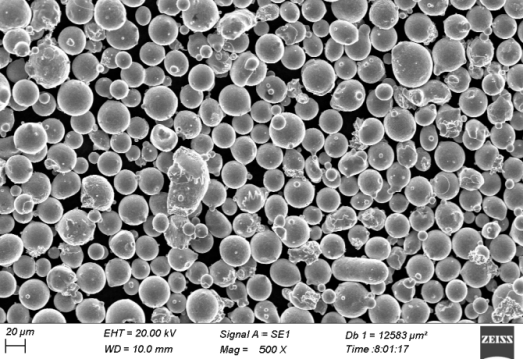
9. FAQs: Everything B2B Buyers Need to Know About Sponge Iron Powder
Here are some of the most frequently asked questions from OEMs, wholesalers, and industrial buyers:
Q1: What’s the difference between sponge iron powder and atomized iron powder?
A: Sponge iron powder is made by reducing iron ore without melting, resulting in a porous structure. Atomized powder is produced by spraying molten metal into fine droplets, which solidify into powder. Sponge iron is often used in PM applications requiring high compressibility, while atomized powder is preferred for more precise applications.
Q2: What is the typical particle size range of sponge iron powder?
A: Particle sizes typically range from 45 μm to 180 μm, depending on the production method and grade. Truer offers customizable particle sizing based on application needs.
Q3: Can I order a custom blend of sponge iron powder for my application?
A: Yes, suppliers like Shanghai Truer specialize in custom formulations for automotive, additive manufacturing, and tooling industries. You can learn more about the company’s capabilities here.
Q4: What is the minimum order quantity (MOQ) for wholesale sponge iron powder?
A: MOQs vary by product and grade but typically start from 500 kg for standard grades. Custom orders may require a higher MOQ depending on specifications.
Q5: How do I ensure consistent quality across batches?
A: Partner with suppliers like Truer, who offer batch testing, COAs (certificates of analysis), and ISO-certified quality systems. This guarantees consistency and traceability.
Q6: How long does international delivery take?
A: Standard lead times range from 2 to 4 weeks depending on order volume and destination. Truer provides real-time shipping updates and flexible delivery options.
Q7: Is sponge iron powder suitable for additive manufacturing?
A: Yes. Sponge iron powder is increasingly used in binder jetting and other AM technologies due to its sinterability and porosity. Truer provides high-purity PM powders optimized for AM—check out their main product page für weitere Einzelheiten.
With this complete guide, B2B buyers can make informed decisions about sourcing sponge iron powder for their manufacturing needs. Whether you’re an OEM in automotive, a distributor in industrial components, or a 3D printing specialist, Shanghai Truer Technology Co., Ltd provides the quality, flexibility, and service you need to scale confidently.
For more information or to place a wholesale order, contact us today.
